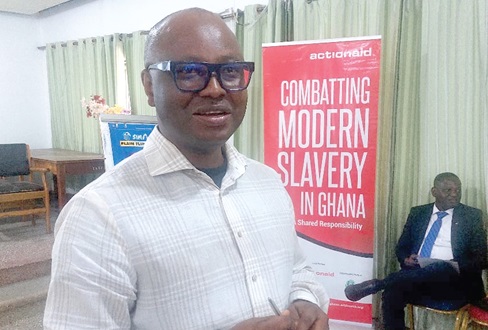
Stakeholders collaborate to combat modern slavery
Over 100 women have been equipped with livelihood skills and start-up kits to undertake economic ventures in the Upper West Region through a three-year project dubbed “Combating Modern Slavery (CMS)”.
The over $1 million project funded by the Norwegian Government (NORAD) in collaboration with ActionAid Ghana (AAG) was aimed at phasing out modern slavery projects in its various forms such as child labour, child trafficking and forced labour from 25 communities in the region.
In all, the three-year project has empowered 400 women and covered 100 communities across 12 districts in five regions, namely Northern, Bono, Upper West, Savannah and Oti.
The districts are Nanumba South, Kpandai, East Gonja, Jaman North and South, Tain, Jasikan, Nkwanta South, Kadjebi, Lawra, Sissala East and Wa East.
The Country Director of AAG, John Nkaw, said this at a regional stakeholders meeting on Combating Modern Slavery (CMS) project in Wa recently.
Fifty-one participants drawn from various public and private sector organisations, including the traditional authorities, Ghana Agriculture Workers Union (GAWU), security agencies and the media attended the programme.
Progress
Mr Nkaw said the project had improved the living conditions of the women through capacity-building programmes and the provision of start-up facilities to reduce their vulnerability to modern slavery.
He was grateful to all the stakeholders who collaborated with AAG, including GAWU, the Ghana Immigration Service and Police Service, to make the CMS project successful.
Speaking on behalf of the consultants who evaluated the CMS project, the Manager in charge of Quality and Knowledge Management, Ali Gbene Malik, said most of the issues relating to the syndrome had been due to unfair cultural practices in the areas.
Mr Malik noted that with child trafficking children are put into such forced labour in households, farms and in the fishing industry locally, while internationally they are taken across the borders and are engaged in prostitution and cyber-crimes.
He said through their survey they had engaged groups of people in educational programmes, after which they assessed 24 agri-businesses from the Chamber of Agri-business under their Anti-Modern Slavery Index.
Mr Malik explained that the anti-modern slavery index was to find out how the women responded to the CMS project, out of which 14 of them turned out to be highly responsive and the other 10 responsive. He said throughout the project, 61 trafficking survivors were rescued.
He was grateful that AAG has a shelter for survivors in the region. He called on the government for more funding and support to establish anti-slavery vigilante groups or bodies and shelters for any survivors they rescued.
The Regional Manager of AAG, Abiba Nibaradun, said at the end of the project, AAG brought in the consultants to assess it so they could send a proper report to the donor, the Norwegian Agency for Development Cooperation (NORAD).
